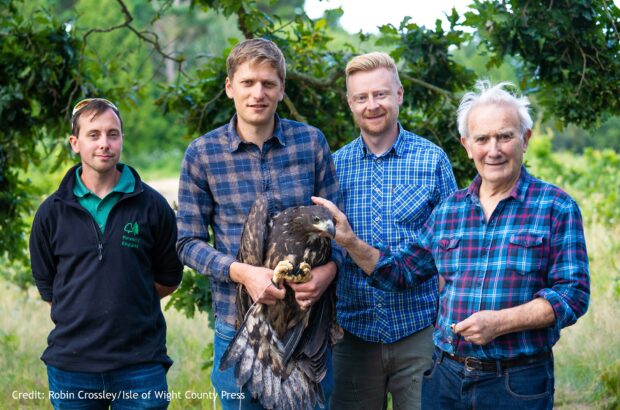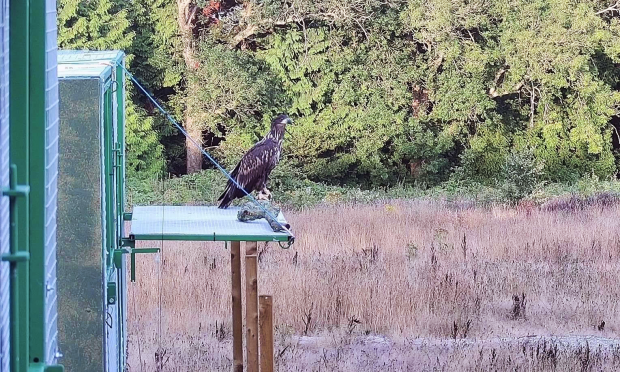
The return of England's white-tailed eagles
Written by Defra Press Office
The return of England’s white-tailed eagles

Thorness - White-tailed Eagle’s being tagged in preparation for release on Wednesday morning. From left, Steve Eggerton-Read with Tim Mackrill, Ian Perks and Roy Dennis. Credit: Forestry England
Today there has been coverage in national media of the successful reintroduction of white-tailed eagles in the Times, Daily Mail, Guardian, BBC and the Isle of Wight County Press.
It is reported that white-tailed eagles have been absent from England for 240 years and were last seen on the Isle of Wight.
The Roy Dennis Wildlife Foundation has been working closely with Forestry England to collect and bring the six eagles from Scotland.
This project has been licensed by Natural England and could see up to 60 eagles released over five years.
The young birds have been carefully monitored and cared for by a dedicated team of experts and volunteers as they acclimatise to their new home, ensuring they settle well to their new surroundings.
As part of this, the birds have also been fitted with small satellite trackers so their progress may be tracked, with hopes that they become a regular sight across the island and along the nearby southern coast. Enticing new prospects for eco-tourism in local communities while providing a deserved success for the years of hard work that have gone into the project.

Credit: Forestry England
The Government has consistently supported the reintroduction of lost former native species, when it has been appropriate to do so, as part of the 25 Year Environment Plan. Recent reintroductions include beavers, the large blue butterfly, red kite, northern goshawk and pool frog.
Environment Secretary, Theresa Villiers said:
I commend the excellent partnership working of Natural England, the Roy Dennis Wildlife Foundation and Forestry England to help bring this majestic bird back to the skies where it once flew.
This release is a great opportunity for the Isle of Wight to expand its eco-tourism market, creating wealth and jobs in the local economy.
We are committed to being a world-leader in protecting and enhancing biodiversity and nature, to help leave our environment in a better state for future generations.
Chairman of Natural England, Tony Juniper, said:
The return of these spectacular birds to England is a real landmark for conservation. I very much hope that it will also provide a practical demonstration of the fact that we can actually reverse the historic decline of our depleted natural environment.
It will also show how helping the recovery of our wildlife can be done at the same time as bringing benefits for people, in this case by offering a boost to the local economy through wildlife tourism, as has happened in Scotland after these birds were reintroduced there back in the 1970s.
As with all applications to restore lost native species, Natural England carefully considered the short and long term impact of reintroducing the eagles on the environment, including implications for local communities as well as the impacts on the animals themselves.
A similar scheme on the island of Mull was found to have boosted its local economy by up to £5 million a year demonstrating how the recovery of our wildlife can play an integral role in boosting the economy of local communities through eco-tourism.
Follow Defra on Twitter, and sign up for email alerts here.
Continue reading on Defra Website...





